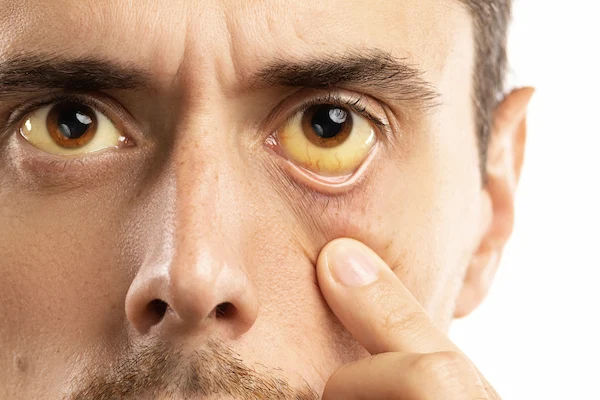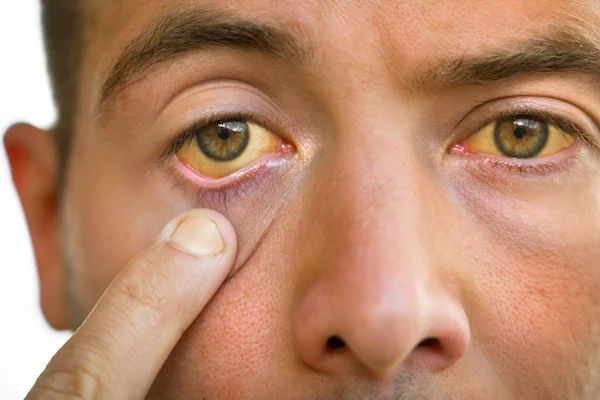Jaundice Causes And Prevention: What You Need To Know
Discover the causes of jaundice, including liver diseases, infections, and blood disorders. Learn effective prevention strategies to protect your liver health and reduce the risk of developing jaundice.

Written by Dr.Sonia Bhatt
Last updated on 3rd Jul, 2025

Introduction
Jaundice is a condition that causes the skin and eyes to take on a yellowish hue due to the buildup of bilirubin, a yellow pigment produced during the breakdown of red blood cells. While jaundice itself is not a disease, it is often a sign of underlying health problems, particularly those related to liver function or red blood cell destruction. Understanding the causes of jaundice and the steps for its prevention is essential for protecting your health and avoiding potential complications. In this article, we will explore the causes of jaundice and how to prevent it.
What is Jaundice?
Jaundice occurs when there is an excess of bilirubin in the bloodstream, leading to the yellowing of the skin, eyes, and mucous membranes. Bilirubin is a by-product of red blood cell breakdown that is processed by the liver. Normally, the liver filters bilirubin, but when its function is impaired or when there is too much bilirubin in the blood, jaundice develops.
There are three main types of jaundice, each with different causes:
Pre-Hepatic Jaundice: Caused by excessive red blood cell breakdown, often seen in conditions like hemolytic anemia.
Hepatic Jaundice: Occurs when liver damage affects its ability to process bilirubin, often caused by liver diseases such as hepatitis or cirrhosis.
Post-Hepatic Jaundice: Results from bile duct blockages, often caused by gallstones or cancer, preventing the proper excretion of bilirubin.
Causes of Jaundice
Liver-Related Causes (Hepatic Jaundice)
The liver plays a critical role in processing and eliminating bilirubin from the body. Damage to the liver can reduce its ability to handle bilirubin, resulting in jaundice. Common liver-related causes of jaundice include:
Hepatitis: Inflammation of the liver caused by viral infections, including Hepatitis A, B, and C. These infections disrupt liver function and can lead to jaundice.
Cirrhosis: A condition characterized by liver scarring due to long-term damage from excessive alcohol use, chronic hepatitis, or fatty liver disease. Cirrhosis impairs liver function, often leading to jaundice.
Fatty Liver Disease (NAFLD): Non-alcoholic fatty liver disease is increasingly common, especially in individuals with obesity, diabetes, or high cholesterol. It can lead to liver dysfunction and jaundice.
Alcoholic Liver Disease: Chronic alcohol use can lead to liver diseases such as alcoholic fatty liver, alcoholic hepatitis, and cirrhosis. These conditions can cause jaundice, especially in more severe stages.
Hemolytic Causes (Pre-Hepatic Jaundice)
Jaundice can also result from excessive red blood cell destruction, which overwhelms the liver’s ability to process the increased bilirubin. This condition is known as hemolysis and can be caused by:
Hemolytic Anemia: Conditions like sickle cell anemia and thalassemia cause red blood cells to break down more quickly than normal, leading to high bilirubin levels in the blood.
Blood Transfusion Reactions: Incompatible blood transfusions can trigger the destruction of red blood cells, resulting in jaundice.
Hemolytic jaundice is less common but can be serious when the breakdown of red blood cells is extensive.
Obstructive Causes (Post-Hepatic Jaundice)
Obstructions in the bile ducts can prevent the normal flow of bile from the liver to the intestines. This leads to the accumulation of bilirubin, resulting in post-hepatic jaundice. Common causes include:
Gallstones: Solid deposits that form in the gallbladder can block the bile ducts, preventing bilirubin from being excreted properly.
Pancreatic Cancer: Tumors in the pancreas can obstruct the bile duct, causing a buildup of bilirubin and resulting in jaundice.
Cholangitis: An infection or inflammation of the bile ducts, often caused by a bacterial infection or blockage, can lead to jaundice if untreated.
Genetic Disorders
Certain inherited conditions can affect the liver’s ability to process bilirubin, leading to jaundice. These include:
Gilbert’s Syndrome: A mild genetic condition where the liver processes bilirubin more slowly, leading to occasional jaundice. It is usually harmless but can cause temporary yellowing of the skin and eyes.
Crigler-Najjar Syndrome: A rare, severe genetic disorder that prevents the liver from processing bilirubin properly, often causing severe jaundice that requires medical intervention.
Other Causes
Infections: Some viral infections, like the Epstein-Barr virus, can cause liver inflammation and jaundice.
Medications: Certain drugs, especially those that affect liver function, such as acetaminophen (paracetamol) in high doses, can cause liver damage and jaundice.
Consult Top Doctors To Know The Causes Of Jaundice
Preventing Jaundice
While jaundice itself is a symptom, its underlying causes can often be prevented or managed through healthy lifestyle choices and medical intervention. Below are some of the most effective ways to reduce the risk of developing jaundice:
Maintain a Healthy Lifestyle
Balanced Diet: A nutritious diet rich in fruits, vegetables, whole grains, and lean proteins supports liver health and reduces the risk of fatty liver disease and other liver-related conditions.
Limit Alcohol Consumption: Excessive alcohol use is a major cause of liver disease, which can lead to jaundice. Limiting alcohol intake or avoiding it altogether helps protect liver function.
Regular Exercise: Maintaining a healthy weight through regular exercise can lower the risk of fatty liver disease and other conditions that lead to jaundice.
Get Vaccinated Against Hepatitis
Vaccination is one of the most effective ways to prevent jaundice caused by hepatitis infections. Hepatitis A and B can cause serious liver damage and jaundice. Vaccines for both types are widely available and recommended for individuals at high risk, such as healthcare workers or travelers to areas where these infections are common.
Prevent Gallstones
Maintain a Healthy Weight: Gradual weight loss through a balanced diet and regular exercise reduces the risk of gallstones, which can block bile ducts and lead to jaundice.
Increase Fiber Intake: A diet high in fiber, particularly from fruits, vegetables, and whole grains, promotes healthy digestion and helps prevent gallstones.
Regular Health Check-Ups
Monitor Liver Health: Regular liver function tests can detect early signs of liver disease, allowing for prompt treatment. These tests are especially important for individuals at higher risk, including those with a history of alcohol use, obesity, or family members with liver disease.
Control Risk Factors: If you have risk factors like high cholesterol, diabetes, or obesity, managing these conditions through medication, diet, and exercise is crucial to preventing liver-related jaundice.
Genetic Testing
If you have a family history of conditions like hemolytic anemia, consider genetic testing or regular screenings to detect early signs of red blood cell breakdown.
Conclusion
Jaundice is a visible symptom of underlying conditions, often linked to liver dysfunction or excessive red blood cell breakdown. By understanding its causes—ranging from liver diseases to genetic factors—you can take proactive steps to reduce your risk. Preventative measures such as maintaining a healthy lifestyle, getting vaccinated, and undergoing regular health check-ups are essential in reducing the likelihood of jaundice. If you notice symptoms like yellowing skin or eyes, seek medical advice promptly. Early detection and intervention are key to preventing complications.
Protecting your liver and overall health is the best way to minimize the risk of jaundice and related conditions, so take action now to safeguard your health.
Consult Top Doctors
Consult Top Doctors To Know The Causes Of Jaundice

Dr. Syed Ismail Ali
General Practitioner
7 Years • MBBS
Hyderabad
Apollo 24|7 Clinic, Hyderabad

Dr. M L Ezhilarasan
General Practitioner
6 Years • MBBS
Visakhapatnam
Apollo 24|7 Clinic - Andhra Pradesh, Visakhapatnam

Dr. Mohammed Kamran
General Practitioner
5 Years • MBBS, FIDM
Nashik
Apollo 24|7 Clinic - Maharashtra, Nashik

Dr. Suraja Nutulapati
General Physician/ Internal Medicine Specialist
10 Years • MBBS, MD (Internal Medicine)
Hyderabad
Apollo 24|7 Clinic, Hyderabad
(850+ Patients)

Dr. D Bhanu Prakash
General Practitioner
10 Years • MBBS, AFIH, Advanced certificate in critical care medicine, Fellowship in critical care medicine
Hyderabad
Apollo 24|7 Clinic, Hyderabad
Consult Top Doctors

Dr. Syed Ismail Ali
General Practitioner
7 Years • MBBS
Hyderabad
Apollo 24|7 Clinic, Hyderabad

Dr. M L Ezhilarasan
General Practitioner
6 Years • MBBS
Visakhapatnam
Apollo 24|7 Clinic - Andhra Pradesh, Visakhapatnam

Dr. Mohammed Kamran
General Practitioner
5 Years • MBBS, FIDM
Nashik
Apollo 24|7 Clinic - Maharashtra, Nashik

Dr. Suraja Nutulapati
General Physician/ Internal Medicine Specialist
10 Years • MBBS, MD (Internal Medicine)
Hyderabad
Apollo 24|7 Clinic, Hyderabad
(850+ Patients)

Dr. D Bhanu Prakash
General Practitioner
10 Years • MBBS, AFIH, Advanced certificate in critical care medicine, Fellowship in critical care medicine
Hyderabad
Apollo 24|7 Clinic, Hyderabad
